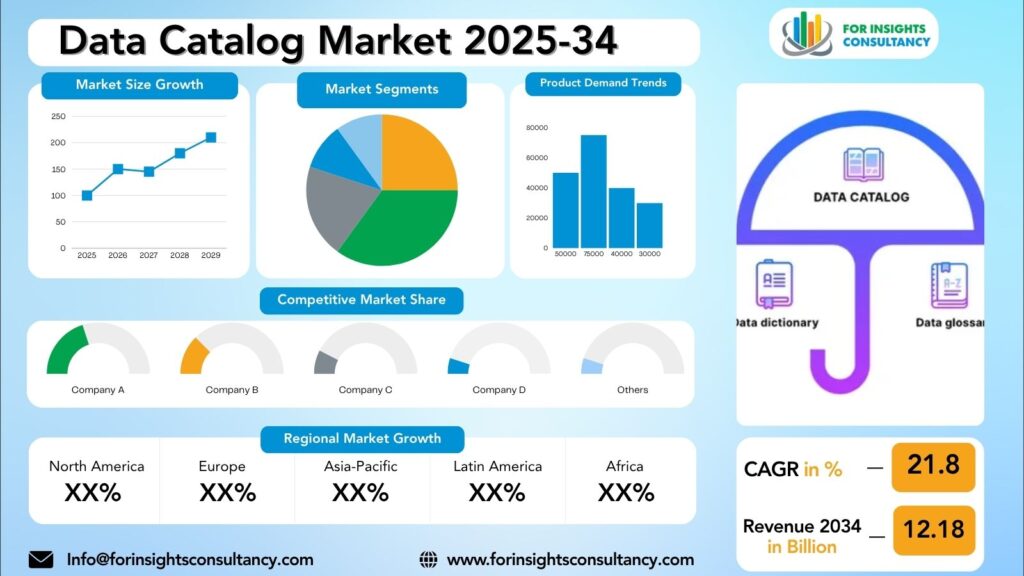
Data Catalog Market Size, Trends Analysis Research Report By Component (Solutions, Services), By Deployment Mode (Cloud-Based, On-Premise), And by Enterprise Size (Large Enterprises, Small and Medium-Sized Enterprises), by End-User Industry, and By Region Global Market Analysis And Forecast, 2025-2034
Sep-2025 Formats | PDF | Category: IT | Delivery: 24 to 72 Hours
Data Catalog Market Is Forecast to Increase from USD 1.6 Billion In 2025 To USD 12.18 Billion By 2034, At A CAGR Of 21.8%.
Data Catalog Market: A Comprehensive Overview and Future Developments
The data catalog market is undergoing notable expansion as organizations increasingly acknowledge the critical need for effective management and accessibility of their data assets. Data catalogs serve as vital tools by offering a detailed overview of an organization’s data sources, thereby facilitating data discovery, governance, and user collaboration.
Looking ahead, advancements in this market are anticipated to emphasize the enhancement of artificial intelligence (AI) and machine learning capabilities. These improvements are expected to automate data classification processes and enrich metadata, leading to better data quality and relevance. Furthermore, the integration of data catalogs with advanced analytics tools is likely, enabling organizations to leverage data for informed decision-making and gaining insights. As organizations confront the challenges of managing vast data volumes, the demand for innovative data catalog solutions is expected to escalate, streamlining data management processes and improving data accessibility.
The Data Catalog Market is witnessing significant expansion, profoundly influencing various sectors worldwide. In finance, data catalogs are being utilized to improve regulatory compliance and enhance risk management. The healthcare sector is undergoing a transformation as data catalogs facilitate easier access to vital medical information, leading to improved patient care. Retail companies are leveraging these catalogs to refine inventory management and analyze customer data, which supports more effective targeted marketing initiatives. Additionally, the manufacturing industry is reaping the benefits of enhanced supply chain visibility and increased operational efficiency through the adoption of data catalogs. Overall, the Data Catalog Market is a catalyst for innovation and transformation across industries, enabling businesses to make informed decisions and maintain competitiveness in the digital landscape.
Market Dynamics
Trends
Trends in the data catalog market are rapidly changing to accommodate the evolving needs of businesses in the digital era. One significant trend is the enhanced integration of artificial intelligence (AI) and machine learning technologies, which are being utilized to improve data discovery and organization, making it easier for businesses to analyze and utilize their data effectively. Another notable trend is the increasing popularity of cloud-based data catalogs, which facilitate convenient and remote access to data, ensuring that users can retrieve necessary information from anywhere, thus supporting the flexibility demanded by modern business operations.
Moreover, there is an increasing emphasis on data governance and security within data catalogs. This focus is essential for ensuring compliance with various regulations and for safeguarding sensitive information against potential breaches. Organizations are recognizing the critical importance of maintaining data integrity and security, prompting them to seek catalogs that incorporate robust governance measures.
Additionally, there is a surge in the integration of metadata management and data lineage capabilities in data catalogs. These features are essential for providing a comprehensive overview of data assets, allowing organizations to trace the origins and usage of their data while maintaining a clear understanding of data relationships across the organization.
In summary, the data catalog market is experiencing a notable evolution characterized by the integration of advanced functionalities aimed at supporting organizations in their quest for effective and efficient data management in a complex digital landscape.
Growth Drivers
The Data Catalog Market is currently undergoing rapid expansion, primarily due to several significant factors. A key driver of this growth is the escalating complexity and volume of data generated by organizations, which necessitates more efficient data management solutions. The increasing adoption of cloud computing and big data analytics further enhances the demand for data catalog solutions that enable businesses to better organize and comprehend their data assets.
Moreover, regulatory mandates such as the General Data Protection Regulation (GDPR) and a heightened focus on data governance and compliance are compelling organizations to invest in data catalog tools aimed at ensuring data quality and security. The demand for self-service data discovery and collaborative tools is also contributing to the market’s growth for data catalog solutions.
Collectively, these factors are driving the Data Catalog Market towards continual expansion and innovation, as organizations strive to prioritize efficient data management and fully leverage the potential of their data assets.
Restraints
Restraints in the data catalog market include challenges related to data privacy and security concerns, as organizations need to ensure that sensitive data is protected. Another restraint is the complexity of integrating data catalogs with existing systems and infrastructure, which can require significant time and resources. Additionally, the lack of awareness about the benefits of data catalogs among small and medium-sized enterprises (SMEs) can hinder market growth. Moreover, the rapid advancements in technology and the evolving regulatory landscape can pose challenges for data catalog vendors to keep up with the changing requirements and standards. Overall, addressing these restraints will be crucial for the successful adoption and growth of the data catalog market.
Opportunities
The Data Catalog Market is a rapidly growing sector with vast opportunities for companies to streamline their data management processes. By investing in data catalog solutions, businesses can improve data discoverability, enhance data governance, and facilitate collaboration among teams. Furthermore, data catalogs offer the potential to unlock valuable insights from diverse data sources, leading to better decision-making and driving business growth. As organizations continue to digitize their operations and accumulate vast amounts of data, the demand for robust data catalog solutions is only set to increase. This market presents a promising landscape for tech companies to innovate and offer tailored solutions to meet the evolving needs of data-driven enterprises.
Challenges
Challenges facing the Data Catalog Market include the need for accurate and timely data classification, ensuring data quality and governance, handling large volumes of diverse data sources, maintaining data security and privacy, and keeping up with evolving data regulations and compliance requirements. Organizations also face challenges in promoting data catalog adoption and collaboration across teams, integrating the data catalog with existing systems and tools, and managing metadata consistency and accuracy. Additionally, as data continues to grow exponentially, scalability and performance issues may arise, requiring robust data catalog solutions to support the increasing complexity and diversity of data assets.
Data Catalog Market Top Companies Covered In This Report:
Evaluate The Strategic Positioning And Innovation Pipelines Of Leading Market Companies-From Multinational Enterprises To Disruptive Regional Firms. Understand How Key Players Are Innovating, Expanding, And Capturing Value, And Use Competitive Benchmarks To Plan Your Next Move.
- Alation, Inc
- Collibra
- Informatica Inc.
- Atlan Pte. Ltd.
- BigID
- QlikTech International AB
- TIBCO Software
- Boomi Corporation
- Okera
- Tableau Software, LLC.
Data Catalog Market Company News
data. World released its AI Context Engine in May 2024, designed to connect Large Language Models (LLMs) with organizational data and business context for more precise, governed responses.
Alation expanded its Allie AI capabilities, including GenAI features, to enhance analytics operations and data management.
Informatica released updates (e.g., April 2025, July 2025 releases) to its Cloud Data Governance and Catalog (CDGC) platform, adding features like AI Model Governance, enhanced lineage discovery, and new tasks inbox functionality.
Companies like Snowflake introduced the Polaris Catalog in June 2024 to facilitate easier data access from multiple platforms while maintaining control. Databricks also made its Unity Catalog available for public procurement, integrating data and AI governance across clouds.
Segmented View of The Industry:
The Data Catalog Market Is Mapped Through A Multidimensional Lens-Tracking Shifts Across Product Type, Applications, And Geographic Regions. This Segmented Approach Enables Businesses to Localize Their Growth Plans And Align Offerings With The Most Profitable Demand Centres.
Segmentation By Component
- Solutions
- Services
Segmentation By Deployment Mode
- Cloud-Based (Dominant)
- On-Premise
Segmentation By Enterprise Size
- Large Enterprises
- Small and Medium-Sized Enterprises (SMEs)
Segmentation By End-User Industry
- BFSI (Banking, Financial Services, and Insurance)
- IT & Telecom
- Healthcare
- Retail & E-Commerce
Global Geographic Coverage:
Based On Recent Market Analysis, North America Is The Largest And Most Mature Market For Very Small Aperture Terminals (Vsat). Its Leading Position Is Driven By Significant Investments In Defense And Government Sectors And A Well-Established Telecommunications Infrastructure.
The Report Provides In-Depth Qualitative And Quantitative Data On The Data Catalog Market For All Of The Regions And Countries Listed Below:
North America
The Data Catalog Market in North America is witnessing remarkable growth, primarily fueled by the rising adoption of advanced analytics and data management solutions across diverse industries. In the United States, organizations are increasingly utilizing data catalogs to enhance data governance, ensure regulatory compliance, and support improved decision-making processes.
This trend is not limited to the U.S., as Canada is also experiencing steady market growth, with businesses acknowledging the significant role of data cataloging in boosting data quality and generating valuable business insights. Meanwhile, in Mexico, the data catalog market is becoming a pivotal component of digital transformation initiatives, particularly in critical sectors such as finance, healthcare, and retail. Organizations in Mexico are adopting data catalogs to facilitate data discovery, bolster data collaboration, and maintain adherence to regulatory mandates. In summary, North America stands as a promising landscape for data catalog vendors, with the United States, Canada, and Mexico presenting significant growth prospects in this domain.
Europe
The Data Catalog Market in Europe is experiencing notable growth driven by the increasing necessity for effective data management solutions. In Germany, a frontrunner in the region, there is a significant rise in data catalog adoption across a variety of sectors, including manufacturing, healthcare, and finance. This surge is largely influenced by the stringent data regulations in the country, which heighten the demand for advanced data catalog tools that facilitate compliance and enhance data governance.
Similarly, France is actively working on improving its data catalog capabilities to bolster data discovery and accessibility. The nation’s strong focus on data privacy and security is further accelerating the adoption of sophisticated data catalog solutions aimed at optimizing data management processes.
The UK market also shows robust growth as organizations emphasize data visibility and governance. The adaptive business landscape in the UK propels the demand for data catalog tools that provide extensive data lineage and metadata management features.
In summary, the European data catalog market is set for sustained advancement, with Germany, France, and the UK at the forefront, fostering innovation and the widespread adoption of data catalog solutions.
Asia Pacific
The Data Catalog Market in the Asia Pacific region is experiencing robust growth, primarily fueled by the increasing adoption of data catalog solutions across diverse industries. In China, this market is particularly vibrant, driven by rapid digital transformation in sectors such as e-commerce, finance, and healthcare. India represents another critical market, characterized by the rise of data-intensive businesses coupled with supportive government initiatives such as Digital India, which promote the adoption of digital solutions. Japan is distinguished by its advanced technological infrastructure and a strong demand for comprehensive data management solutions that cater to various business needs. Additionally, Australia is leveraging its burgeoning IT sector to integrate data catalog tools for improved decision-making processes. South Korea is emerging as a significant player as well, focusing on utilizing data to foster innovation and enhance competitiveness in a global context.
Overall, the landscape of the data catalog market in the Asia Pacific is dynamic and competitive, with each country presenting unique opportunities and challenges for vendors and businesses, thereby contributing to a diverse ecosystem of data management solutions.
Middle East and Africa
The Data Catalog Market in the Middle East and Africa is showing remarkable growth, largely due to the heightened adoption of data catalog solutions across various industries. In the Middle Eastern countries, particularly Saudi Arabia, the UAE, and Qatar, there is a strong inclination towards implementing data catalog solutions to optimize data management processes. These nations aim to leverage data catalog tools to enhance data governance, ensure data quality, and improve data discovery capabilities.
In Africa, countries including Nigeria, South Africa, and Kenya are experiencing a swift adoption of data catalog solutions to manage and optimize their data resources effectively. The focus here is on data governance and compliance, with many organizations employing data catalog platforms for centralized metadata management, data lineage tracking, and enabling self-service data discovery.
Overall, the Middle East and Africa present substantial opportunities for vendors in the data catalog sector, as organizations across these regions increasingly acknowledge the necessity of robust data management. They are thus investing in sophisticated data catalog solutions to foster business growth and innovation.
Reasons To Buy:
- The Research Would Help Top Administration/Policymakers/Professionals/Product Advancements/Sales Managers And Stakeholders In This Market In The Following Ways.
- The Report Provides Data Catalog Market Revenues At The Worldwide, Regional, And Country Levels With A Complete Analysis To 2034 Permitting Companies To Analyze Their Market Share And Analyze Projections, And Find New Markets To Aim For.
- To Understand The Most Affecting Driving And Restraining Forces In The Market And Their Impact On The Global Market.
- Major Changes And Assessment In Market Dynamics And Developments.
- The Objective Of The Data Catalog Market Report Is To Identify New Business Opportunities Using Quantitative Market Forecasts.
- Formulate Sales And Marketing Strategies By Gaining An Understanding Of Competitors, Their Positioning, And Strengths & Weaknesses.
Faq – What Global Leaders Are Asking
What Is The Growth Prospect For The Data Catalog Market By 2034?
Data Catalog Market Is Expected To Achieve A Stable Growth Rate With A Compound Annual Growth Rate (CAGR) Of About 21.8% From 2025 Through 2034.
What Is Driving The Growth Of The Data Catalog Market?
The exponential growth in data volume and complexity, coupled with the mass migration to multi-cloud environments, necessitates a central system. Strict global regulatory mandates for data governance and compliance (e.g., GDPR) further drive adoption by requiring automated lineage and auditability.
Who Are The Key Players In The Data Catalog Market, And What Are Their Market Shares?
The Data Catalog Market Includes Major Companies Like Alation, Inc, Collibra, Informatica Inc., Atlan Pte. Ltd., BigID, QlikTech International AB, TIBCO Software, Boomi Corporation, Okera, Tableau Software, LLC, Others.
Specific Market Share Data Is Not Publicly Available And Is Typically Provided In Detailed, Proprietary Market Research Reports.
Which Regions Are Leading The Data Catalog Market Growth?
North America holds the largest market share due to its early adoption of advanced analytics and a high concentration of key technology vendors. Asia-Pacific (APAC) is projected to be the fastest-growing region, driven by rapid digital transformation and massive data generation in countries like China and India.
Customization: We Can Provide Following Things
1) On Market More Company Profiles (Competitors)
2) Data About Particular Country Or Region
3) We Will Incorporate The Same With No Additional Cost (Post Conducting Feasibility).
Any Requirement Contact Us: Https://Www.Forinsightsconsultancy.Com/Contact-Us/
Table of Contents
For TOC Contact us: https://forinsightsconsultancy.com/contact-us/






